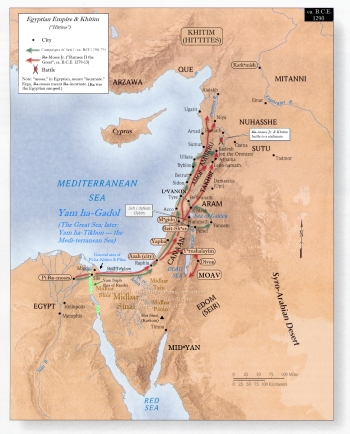
 |

 |
On the 15th of Secondmonth, Bᵊn•eiꞋ-Yi•sᵊrâ•eilꞋ caravanned eastward along the northern Sinai coast from Eil•imꞋ to Mi•dᵊbârꞋ Tzin,![]() which is between Eil•imꞋ and Sin•aiꞋ.
which is between Eil•imꞋ and Sin•aiꞋ.
Within a few months, everyone in Ad•atꞋ Bᵊn•eiꞋ-Yi•sᵊrâ•eilꞋ was complaining to Mōsh•ëhꞋ and A•ha•ronꞋ in the mi•dᵊbârꞋ.
“We'd have been better-off dying in Mi•tzᵊraꞋyim by the arm of Par•ohꞋ. At least there we had pots of bâ•sârꞋ-stew and all of the lëkhꞋëm we could eat. But no, you brought us out into this mi•dᵊbârꞋ where we're all going to starve to death.”
“Look, I'll rain lâ •khëmꞋ lëkhꞋëm from the heavens. So the am may go out and harvest the stuff daily – so that I can test-prove them: whether they will walk in My Tōr•âhꞋ – or not.”
“Ergo, on Sixthday they shall harvest and bake twice as much as the other weekdays.”
So Mōsh•ëhꞋ and A•ha•ronꞋ told Bᵊn•eiꞋ-Yi•sᵊrâ•eilꞋ:
"Now it's ërꞋëv. In the morning you shall know that it is é‑‑ä Who has enabled your going-forth from ËrꞋëtz Mi•tzᵊraꞋyim when you see the kâ•vodꞋ é‑‑ä. For He has heard your complainings against é‑‑ä. But what is the importance of Mōsh•ëhꞋ and A•ha•ronꞋ, my brother and me, mere humans, that you complain against us about things beyond human control?"
"As é‑‑ä gives you bâ•sârꞋ in the ërꞋëv and your fill of lëkhꞋëm in the morning, so é‑‑ä is hearing your complainings to Him. But who are we? Your complaints should be to é‑‑ä, not to us."
Then Mōsh•ëhꞋ said to A•ha•ronꞋ,
"Tell all of Ad•atꞋ Bᵊn•eiꞋ-Yi•sᵊrâ•eilꞋ:
“Come close before é‑‑ä for He has heard your complainings.”
Then, as A•ha•ronꞋ began speaking to all of Ad•atꞋ Bᵊn•eiꞋ-Yi•sᵊrâ•eilꞋ, they faced the mi•dᵊbârꞋ and, look, they perceived the kâ•vodꞋ é‑‑ä to be in the smoke-cloud — the Voice of é‑‑ä speaking to Mōsh•ëhꞋ saying,
“I've heard the complainings of Bᵊn•eiꞋ-Yi•sᵊrâ•eilꞋ. Tell them: ‘During ërꞋëv,
you shall eat bâ•sârꞋ and in the morning you shall eat your fill of lëkhꞋëm. Then you may know that I am é‑‑ä your ël•oh•imꞋ.’ ”

Optional parental preparation:
Tzin? Or Sin? — According to the parallel account in bᵊ-Mi•dᵊbarꞋ 20, the spelling is öÄéï rather than ñÄéï, which doesn't exist.
The location immediately following differentiates it from Mi•dᵊbârꞋ Sin•aiꞋ, which abuts Mi•dᵊbarꞋ Tzin along NaꞋkhal [Arabic: wadi] el-Ar•ishꞋ, the seam between the two wildernesses.
Their caravan route southeast from Eil•imꞋ/Rᵊphid•imꞋ![]() (modern el-Ar•ishꞋ,
(modern el-Ar•ishꞋ,![]() which served as their secondary city for the 40 years subsequent to the Yᵊtzi•âhꞋ, took them right down the seam between the two arid arid-wildernesses, being stopped just short (northwest) of Qâ•deishꞋ Bar•neiꞋa. Thus, the area from modern el-Arish, on the northern Sinai coast, to just northwest of, but not entering, Qâ•deishꞋ Bar•neiꞋa seems to have been the region occupied by Israel during most of those 40 years "wandering." This regional seam allowed Israel geographic separation from all foreign enemies of the region (Mi•tzᵊraꞋyim, Pᵊli•shᵊt•inꞋ, Ë•dōmꞋ-A•mâ•leiqꞋ, Mi•dᵊyânꞋ and Kᵊna•anꞋ) while affording Israel proximity to Har Sin•aiꞋ.
which served as their secondary city for the 40 years subsequent to the Yᵊtzi•âhꞋ, took them right down the seam between the two arid arid-wildernesses, being stopped just short (northwest) of Qâ•deishꞋ Bar•neiꞋa. Thus, the area from modern el-Arish, on the northern Sinai coast, to just northwest of, but not entering, Qâ•deishꞋ Bar•neiꞋa seems to have been the region occupied by Israel during most of those 40 years "wandering." This regional seam allowed Israel geographic separation from all foreign enemies of the region (Mi•tzᵊraꞋyim, Pᵊli•shᵊt•inꞋ, Ë•dōmꞋ-A•mâ•leiqꞋ, Mi•dᵊyânꞋ and Kᵊna•anꞋ) while affording Israel proximity to Har Sin•aiꞋ.![]() .
. ![]()
Questions you might anticipate that your child might raise and be prepared to discuss:
What does "harvest" mean?
What does "test-prove" mean?
What does "ergo" mean?
What is "Sixthday"?
![]()
 |
 |